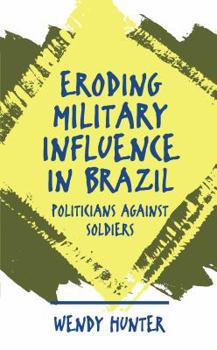Eroding Military Influence in Brazil: Politicians Against Soldiers
Select Format
Select Condition 
Book Overview
Wendy Hunter explores civil-military relations in Brazil following the transition to civilian leadership in 1985. She documents a marked, and surprising, decline in the political power of the armed forces, even as they have remained involved in national policy making. To account for the success of civilian politicians, Hunter invokes rational-choice theory in arguing that politicians will contest even powerful forces in order to gain widespread electoral support.
Many observers expected Brazil's fledgling democracy to remain under the firm direction of the military, which had tightly controlled the transition from authoritarian to civilian rule. Hunter carefully refutes this conventional wisdom by demonstrating the ability of even a weak democratic regime to expand its autonomy relative to a once-powerful military, thanks to the electoral incentives that motivate civilian politicians. Based on interviews with key participants and on extensive archival research, Hunter's analysis of developments in Brazil suggests a more optimistic view of the future of civilian democratic rule in Latin America.
Many observers expected Brazil's fledgling democracy to remain under the firm direction of the military, which had tightly controlled the transition from authoritarian to civilian rule. Hunter carefully refutes this conventional wisdom by demonstrating the ability of even a weak democratic regime to expand its autonomy relative to a once-powerful military, thanks to the electoral incentives that motivate civilian politicians. Based on interviews with key participants and on extensive archival research, Hunter's analysis of developments in Brazil suggests a more optimistic view of the future of civilian democratic rule in Latin America.
Format:Paperback
Language:English
ISBN:0807846201
ISBN13:9780807846209
Release Date:March 1997
Publisher:University of North Carolina Press
Length:260 Pages
Weight:1.03 lbs.
Dimensions:0.8" x 6.2" x 9.3"
Grade Range:Postsecondary and higher
Customer Reviews
5 ratings
Great text book material.
Published by Thriftbooks.com User , 25 years ago
Wendy Hunter's theory about civilian political incentives are very intersting. I was able to get a clear understanding of the book by reading her examples. I found chapter six very intresting because it relates to the Amozon and the efforts by external democratic forces to preseve the ecological settings. [email protected]
Great text book material.
Published by Thriftbooks.com User , 25 years ago
Wendy Hunter's theory about civilian political incentives are very interesting. I was able to get a clear understanding of the book by reading her examples. I found chapter six very interesting because it relates to the Amozon and the efforts by external democratic forces to preseve the ecological settings. [email protected]
a study of the political dynamic vs. the military
Published by Thriftbooks.com User , 25 years ago
Ms. Hunter has written a book that goes against the accepted tenets of transitional democracies. She shows how the political dynamic of office and the money and power of elected office can reverse the influence of the military ,and go a long way towards consolidating a democracy.
Excellent thesis.
Published by Thriftbooks.com User , 25 years ago
This book is very good if you want to learn more about civil-military relations and how it affects democratization. Ms. Hunter's theory is that democracy and the electoral competition it brings will cause the military regime to lose power. Others disagree with this view but to be perfectly honest, it is hard to understand that view because Ms. Hunter proves her theory extremely well.
New perspective on an old problem
Published by Thriftbooks.com User , 25 years ago
Hunter uses the rational choice and competitive dynamic theory to explain civilian democratic gains over the military in the late 20th century. She is able to prove that in many ways, democratic political incentives have reduced the influence of the military in Brazil. From a student's perspective, the last chapter (conclusion) provides a framework to the preceeding chapters. START THERE FIRST!!






